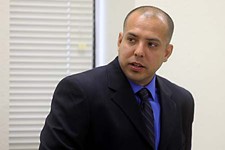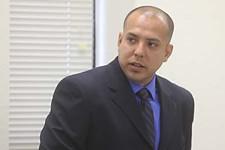Point Austin: Drinking, Driving, Shooting ... and the APD
Leonardo Quintana hearing full of unintended revelations
By Michael King, Fri., Sept. 10, 2010

As things stand right now, if it weren't for bad luck, Quintana would have no luck at all. In May, Chief Art Acevedo concluded that Quintana's ensuing DWI (still being adjudicated) was the final piece in a "pattern of bad judgment" on the part of the 10-year officer and fired him. "At some point, you have to cut your losses," Acevedo testified, and it's hard to argue with him.
Nominally, the firing and this hearing addressed every bad moment in Quintana's APD career except the most notorious, his May 2009 shooting of Nathaniel Sanders II in the parking lot of a Springdale Road apartment complex. He was called to account for the DWI, for earlier altercations with an ex-fiancée (including a forced entry into their once-shared home), and even for a thoughtless photo-posting on Facebook of himself holding an automatic weapon, captioned "Back at Work." The Sanders shooting entered only indirectly, as the occasion on which Quintana failed to activate his squad-car video camera, the single alleged infraction sustained by Acevedo. (Hence the 15-day suspension from which Quintana Facebooked his return.) But the shooting also shadowed the January DWI, because on that day Quintana had undergone a six-hour deposition for the civil lawsuit by Sanders' family, before accepting an invitation from a fellow officer to "get his mind off his troubles" by partying.
Let's Go Get Stoned
As Smith notes, Quintana was far from the only officer drinking to excess that night, nor did anyone have enough sense (or training?) to take Quintana's keys when it was obvious he'd had more than enough. Yet none of those officers were disciplined or even investigated. (The entire episode reflects an alarming, if unsurprising, casual drinking culture among cops, not the most recommended form of stress-relief for armed officers.) The plain truth is that after the Sanders shooting, Quintana was a publicly marked man, despite the APD's (and the city's) official insistence that the shooting itself had been justified. Indeed, the city's attorney, Michael Cronig, repeatedly argued that Quintana failed to realize that he was "under the microscope" after the shooting and that his every indiscretion would be magnified beyond the immediate circumstances.
So it seems, whatever the arbitrator decides, Quintana would be well advised to seek employment elsewhere, if only to get a fresh start away from the circumstances that (by his own admission) produced a serious flirtation with alcoholism. His current predicament should evoke some sympathy, because the APD wants to have it both ways: Quintana's termination is not for the shooting, but without the shooting he wouldn't have been terminated. Sanders family attorney Adam Loewy says bluntly that APD has decided to throw the former officer "under the bus." Whether that's true or not, it's pretty clear that the shooting was the real turning point for Quintana and the APD, and (thanks to City Council's recent refusal to settle the Sanders family lawsuit) the aftermath will likely remain a cloud over the whole city for at least another year while we wait for the federal civil rights lawsuit to proceed.
Shoot First, Settle Later
There are those who believe that after a moderating interval, cooler heads will prevail and some settlement will be arranged in the coming months. Loewy apparently doesn't think so, however, as he said last week that in recent weeks his clients had formally rejected a city offer of $500,000 ("or somewhere close to it"), and after its very public rejection of the recommended settlement ($750,000), the City Council seems equally unlikely to budge.
Loewy took the opportunity of Quintana's appeal hearing to take another blast at the Austin Police Association, which he blames for publicly and privately pressuring the council to kill the deal, over Quintana's own opposition and against his interests. Loewy wrote to the
Statesman editorial board wondering where was the APA's "massive media and political campaign" in support of Quintana's appeal and arguing that APA President Wayne Vincent is only interested in his union's political clout.
"Where is Wayne Vincent and the APA?" asked Loewy. "Where is the massive media campaign [devoted] to 'helping' Quintana get his job back? Where are the repeated visits to Councilmembers' [offices] pleading with them to help get his job back? Where is the Mayor on this important issue?" Loewy concludes, "It is so blatantly obvious that the Union did not care about Quintana in July; they only cared about themselves and their position as a Boss Tweed political power player in this town."
It's not readily apparent how roiling those particular waters is likely to help Loewy's client, the Sanders family, come to some kind of accommodation with the city – perhaps that is not even the attorney's intent. But since several council members are already on record blaming Loewy's public statements about the shooting for their own reluctance to settle – a notion Loewy rejects as both absurd and dishonest – one has to wonder whether baiting the APA will only give the council another public excuse for continued intransigence, especially as the year turns and spring campaign season begins. Loewy certainly seems ready for a fight, telling me, "The city can either respect the terms of the deal, or they will have to explain to a jury why they think it is acceptable to lie to my clients in settlement negotiations."
Will all this continued posturing, tsuris, and public polarization be worth the $250,000 the council "saved" by rejecting the settlement recommended by the city's own attorneys? In the larger scheme of things – otherwise known as what's best for the whole community – it's difficult to think so.
*[Editor's note: The original, print version of this story mistakenly attributed Loretta Lynn’s song “Don’t Come Home a’ Drinkin’ (With Lovin’ on Your Mind)” to Tammy Wynette – who did record the song, but it is indubitably Lynn’s composition and a signature tune. Michael King profusely apologizes for the error.]Got something to say on the subject? Send a letter to the editor.










